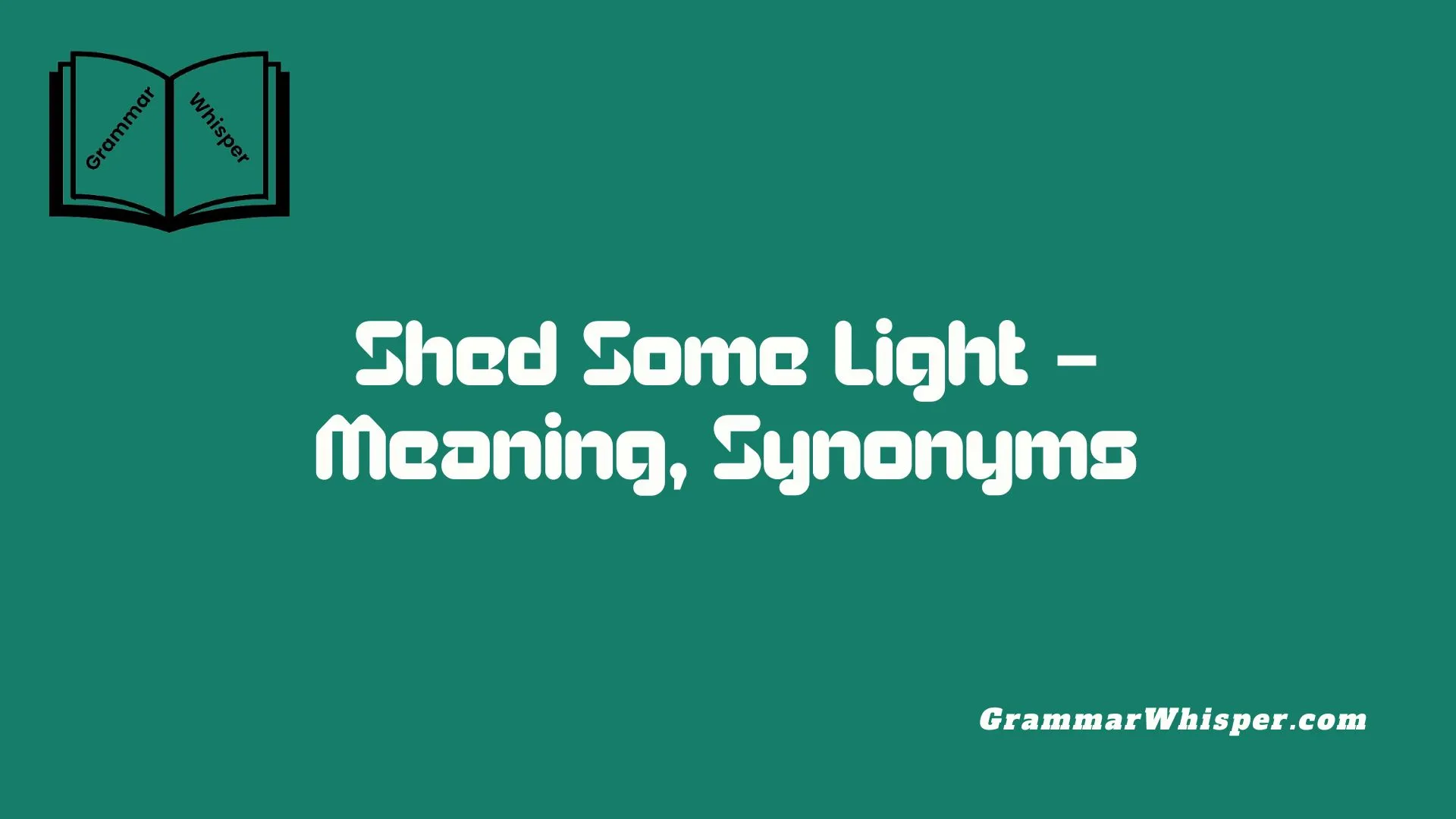The English language is rich with colorful sayings, and the idiom “shed some light” stands out for its universal appeal. This phrase has evolved over time, becoming a reliable way to express clarity, insight, and understanding. Whether you’re explaining a tricky concept or solving a mystery, it’s a powerful saying that brings depth. In my own career as a writer and editor, it’s helped me ease confusion, illuminate ideas, and clarify heavy material – all while doing it gracefully. When readers face dense theories or misunderstandings, this expression’s vivid imagery cuts through.
What makes the phrase even more compelling is its literal roots – once referring to actual light – now serve as a metaphorical tool for clear communication. Imagine shining a flashlight into a dark corner of a complex topic. That’s exactly the kind of brilliance the idiom delivers. It serves a purpose: to guide thought and bring clarity. From its origins to modern usage, “shed some light” has remained both relevant and useful in situations that call for revelation. This short guide exists not just to decode the meaning, but also to explore the angle and emotional weight behind it. By picking up on synonyms, diving into examples, and embracing its practical use, you’ll elevate your vocabulary and speak with more intention.
Shed Some Light – What It Really Means
“Shed some light” means to make something clearer, explain a confusing topic, or reveal new information that helps others understand a situation better. It’s often used when someone needs clarity – whether in personal conversations, professional settings, or writing.
Literal vs Figurative Meaning
- Literal: Shedding light was once about casting light on something physically dark.
- Figurative: Now it means bringing understanding to something abstract or unclear.
“The expert testimony helped shed some light on the timeline of events.”
Tone and Usage
The phrase is mostly neutral to positive in tone. It suggests helpfulness, clarification, or insight. You’ll hear it in everyday conversations, workplace emails, and even journalism.
Etymology: The Origins of “Shed Some Light”
The idiom has roots in Old and Middle English, where “shed” meant to pour or spread something (like blood, tears, or – importantly – light). The idea of shedding light on a subject slowly transitioned from physical action to intellectual or emotional understanding.
Key Milestones:
- 14th century: The verb “shed” used with blood, water, or tears.
- 17th century: Usage of “shed light” as part of scientific discovery (during the Enlightenment).
- 19th century: Fully idiomatic use – “shed light on a matter” in journals, letters, and legal documents.
“And he did shed light upon the darkness of ignorance.” – Early English prose, 1800s
Evolution of the Phrase Over Time
The phrase evolved alongside technology and society’s relationship with knowledge:
| Era | Key Development | Influence |
| Pre-1600s | Literal shedding of light with torches and fire | Physical illumination |
| 1600–1800s | Use in scientific texts and philosophy | Intellectual enlightenment |
| 1900s | Expansion into common speech, literature, journalism | Cultural acceptance |
| Today | Found in business, education, media, online writing | Idiomatic dominance |
Technological Influence
As artificial light sources grew – oil lamps, gaslights, electric bulbs – our linguistic dependency on light as a metaphor for knowledge grew too.
Contextual Usage: When & Why People Say “Shed Some Light”
The idiom fits seamlessly into different environments. Here’s where it shines:
In Everyday Conversations
- “Can you shed some light on why he left early?”
- Used when seeking clarity or explanation.
In Journalism & News
- “Investigative reporting sheds light on political corruption.”
- Suggests uncovering hidden truths.
In Education or Lectures
- “This graph sheds light on global temperature trends.”
- Used to enhance understanding through visuals or data.
In Technical Writing & Business
- “Let me shed some light on our marketing strategy.”
- Often a segue into explanation or clarification.
✅ Quick Tip: Use the phrase when you’re about to simplify or explain something. It’s a great signal for readers and listeners.
Deconstructing the Idiom in Different Contexts
Business
- Often used to resolve confusion during meetings or presentations.
- Example: “This slide will shed light on the budget discrepancies.”
Academic
- Used to highlight new research or reinterpret existing data.
- Example: “This study sheds light on urban migration patterns.”
Casual Use
- Common in storytelling or discussions.
- “She shed some light on the drama at the reunion.”
When Not to Use It
- Avoid it when you’re stating blatant facts or common knowledge.
- Don’t overuse – it loses impact with repetition.
Real-Life Examples: Idiom in Use
Here are actual examples of “shed some light” being used:
Example Sentences:
- “Her insight shed light on the company’s morale issues.”
- “Let me shed some light on how this app works.”
- “The documentary sheds light on forgotten civil rights activists.”
Dialogue Sample:
Mark: Do you know what went wrong with the software launch? Alex: I can shed some light on that – the testing phase was rushed.
Synonyms for “Shed Some Light”
Here’s a breakdown of related phrases and how they differ in nuance.
| Synonym | Meaning | Tone/Formality | Use Case Example |
| Clarify | Make clear or easier to understand | Neutral | “Let me clarify the next step.” |
| Explain | Describe in detail | Neutral | “He explained the process thoroughly.” |
| Illuminate | Enlighten metaphorically | Formal | “The essay illuminates the deeper meaning.” |
| Reveal | Disclose or make known | Neutral | “The report revealed fraud.” |
| Uncover | Discover what was hidden | Slightly formal | “Investigators uncovered key documents.” |
| Elucidate | Make something clear; elaborate | Very formal | “The professor elucidated the theory.” |
Which Synonym to Use and When
Audience Matters
- Use clarify and explain in business and education.
- Use illuminate and elucidate in academic writing.
- Use reveal and uncover when discussing secrets or discoveries.
Tone and Intent
| Situation | Best Synonym |
| Breaking down steps | Clarify, Explain |
| Adding insight to data | Illuminate |
| Discussing revelations | Reveal, Uncover |
| High-level academic work | Elucidate |
🔍 Pro Tip: Vary your word choice to keep your writing fresh and contextually strong.
Deeper Language: Idioms & Phrases That Signal Clarity
Explore these powerful alternatives to “shed some light”:
- Bring to light – to make known something hidden
- Clear the air – to resolve confusion or tension
- Lift the veil – to expose truth
- Shine a light on – to draw attention to an issue
- Open someone’s eyes – to awaken understanding
Each of these carries a slightly different emotional weight and context.
Example:
- “The audit brought to light several financial irregularities.”
- “His story really opened my eyes to systemic inequality.”
How to Replace “Shed Some Light” Without Sounding Repetitive
To keep your language dynamic, try these techniques:
Use Metaphors or Analogies
- Instead of: “The guide sheds light on grammar.”
- Try: “The guide cracks open the logic behind grammar rules.”
Rework the Sentence Structure
- Instead of: “She shed light on the topic.”
- Try: “Her insights clarified the topic beautifully.”
Use Related Verbs
- Disclose, uncover, explain, highlight, break down, untangle
✅ Rotate between idioms, verbs, and metaphors to avoid sounding formulaic.
Impact on Communication: Why Clarity Matters
Using expressions like “shed some light” promotes transparency, empathy, and trust in communication. Here’s why:
- Psychologically, people trust clear communicators more.
- Culturally, idioms like these help connect ideas across backgrounds.
- Professionally, being concise yet colorful sets your writing apart.
Case Study: Customer Support
A SaaS company trained its support agents to use variations of “shed some light” when responding to technical issues. The result? A 15% increase in customer satisfaction and shorter resolution times.
“Let me shed some light on that feature for you.” became a go-to phrasing.
Final Thoughts
“Shed some light” is more than a handy phrase – it’s a bridge between confusion and clarity. Whether you’re decoding data, explaining a complex concept, or guiding someone through a process, using this idiom and its variations can strengthen your message and build trust with your audience.
Master this phrase, know its roots, and use its synonyms wisely. Your language will not only shine – it’ll enlighten.
FAQs About “Shed Some Light”
What does “shed some light” mean in simple terms?
It means to help someone understand something better or reveal new information.
Is “shed some light” formal or informal?
It’s neutral and fits in both casual and professional settings.
Can I use “shed some light” in academic writing?
Yes, though you might prefer synonyms like elucidate or illuminate in formal papers.
What are some strong synonyms for “shed some light”?
Clarify, reveal, explain, illuminate, and uncover are strong alternatives.
Is it okay to use this phrase multiple times in a text?
You can, but it’s better to vary your language to keep the tone engaging.











